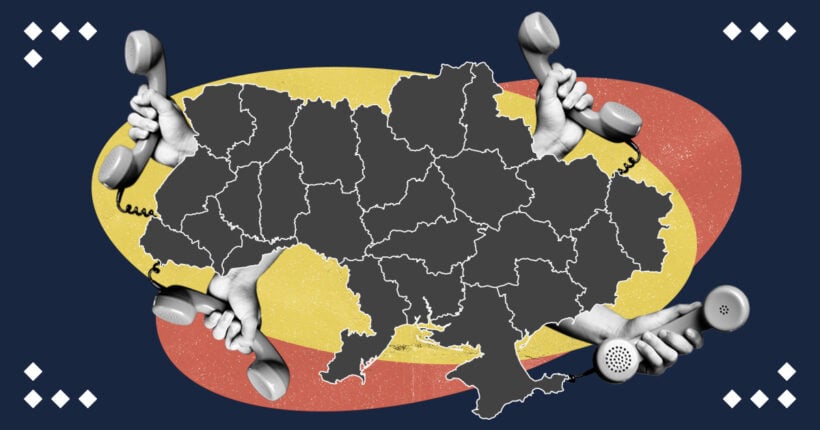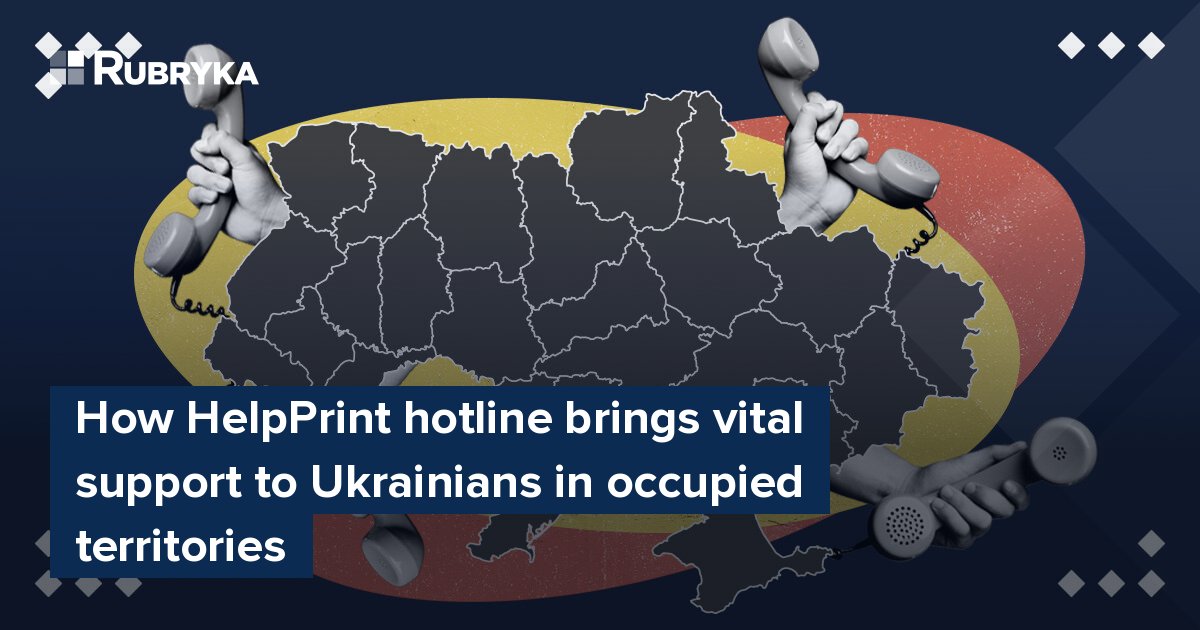
What's the problem?
It has been ten years since Russia first invaded Ukraine. During this time, cities and villages in the eastern Donetsk and Luhansk regions occupied by Russians have been in an information blockade. Even talking to relatives in free Ukraine is difficult for people in these areas — calls don't go through, and Facebook and some messengers are blocked.
When Russian media broadcasts are filled with lies and propaganda, finding accurate information about what's happening in Ukraine, Russia, and the world is challenging for people in temporarily occupied territories (TOT).
What's the solution?
In February of this year, the Eastern Variant unveiled a hotline for residents of front-line and Russian-occupied territories.
The HelpPrint hotline offers a way to get reliable information, share personal stories anonymously, report on events in occupied cities, and seek help.
Rubryka spoke with Valeria Krupoderia, the hotline coordinator, to find out how HelpPrint works and whether it has been helpful.
How does it work?
Bridge of communication between Ukraine and occupied territories

Illustration by the Eastern Variant
According to Eastern Variant, the hotline is meant to shine a light on what happens in occupied territories and cover the stories of people living under Russian occupation. However, in just under four months, HelpPrint has become a support system for people in an information vacuum.
"Before the full-fledged invasion [of 2022], the Eastern Variant already served as a bridge between the temporarily occupied territory and free Ukraine," says Valeria Krupoderia, the hotline coordinator. Since the Russian invasion of Ukraine's east in 2014, Eastern Variant reported on and for Ukrainians in occupied cities. Donetsk, Makiivka, and Luhansk were in the top 10 cities with the most readers.
"We knew we couldn't lose contact with Ukrainians living under temporary occupation. So, we created a mirror website that bypasses Russian blocking. Of course, people still had, or rather, increased their information needs, which they kept asking us to meet. This trust became the highest recognition and motivation for us to work even harder," Kripoderia adds.
That's why Eastern Variant launched the HelpPrint hotline for residents of the front-line and temporarily occupied territories in Ukraine. The service will direct Ukrainians to specialized organizations and consult on various topics. According to Valeria, the hotline will be helpful to anyone who needs support or wants to share information.
"We are receiving requests from our people in the occupation who want to leave or are trying to find solutions to their issues. We are moved by the bravery of these people and their belief in the return of the Ukrainian flag to their hometowns," says Valeria Krupoderia.
About security
"As we did at the beginning, we still want more people to know about the HelpPrint initiative. We understand that many people in occupied areas are scared to seek help online. Still, we always emphasize that our top priority is the safety of the person asking for help," says Valeria Krupoderia.
Information about the hotline is available through the Eastern Variant Telegram channel and the media's website.
The hotline is equipped with modern communication tools, including connections through messengers like:
- Hotline number: +380914818150 (for safety, the number may change)
- Email: [email protected]
- Telegram: @Help_print_bot
- Telegram bot for registering requests: @eastvar_bot
- Viber: Help Print Bot
- Skype: Help Print
- WhatsApp: Help Print
- Signal: +380738955177
Before launching the hotline, the team consulted with digital security experts. Although it is a secure ecosystem, users must still follow basic safety rules. The HelpPrint coordinator always reminds people to clear their chat history.
Valeria Krupoderia says it's better to use messengers with high levels of encryption for communication, such as Signal or WhatsApp. However, most people use the chatbots on Telegram and Viber. These individuals often face difficult situations, so they need help immediately.
"We work like paralegals or paramedics"
Sometimes, Eastern Variant creates and publishes a deep-dive article after the hotline receives a request: some issues don't have straightforward solutions and require broad discussion with experts.
For example, displaced persons often ask about finding humanitarian aid, medicines, and financial support. They also ask about renewing Ukrainian documents or even issuing a death certificate for someone in the occupied territory. After receiving a request, the coordinator looks for contacts of organizations that work on these specific issues.
If a person cannot contact specialists independently, the operator takes on this responsibility. The main goal is to start resolving the request and maintain contact until it's resolved. The operator always follows up to see what stage the issue is at.
More and more people in the occupied areas are concerned about forced passportization — Russian-appointed authorities demand that Ukrainians obtain Russian passports.
"I'm waiting for the Ukrainian government to return, so I'm not getting a Russian passport," Yevhen (name changed for safety reasons) wrote to the hotline chatbot.
Yevhen has been living in the temporarily occupied territory since 2014. He wants to avoid getting a Russian passport. He wants to know if it's possible under the current conditions, where Ukrainians are forced to get a Russian passport to receive essential medical services.
While processing this request, the Eastern Variant editorial team, along with human rights advocates, created an article on forced passportization. The main point was that Ukrainians under Russian occupation were victims, so their primary task was to survive, even if it meant complying with the occupiers' demands. Ukrainian law does not penalize getting a Russian passport in the occupied territory.
Another prevalent issue is preserving Ukrainian pensions, which reporters and experts analyzed in a specially created article.
Ukrainians in the occupied territories often look for ways to move to Ukraine-controlled areas, especially for their immobile relatives. Issues related to leaving the occupation always require the highest attention from the coordinator and are genuinely challenging. These requests are immediately passed to specialists from organizations that evacuate Ukrainians from Russia and the TOT.
"Ukrainians interested in evacuation are mostly referred directly to our colleagues at 'Helping to Leave.' We're currently working on resolving such a request, so we can't share details yet," says the hotline coordinator.
Does it really work?
Since February, the hotline has handled about 100 requests. The project team is constantly in touch with the Caritas charity organization, which helps people in difficult humanitarian situations. They also collaborate with Helping to Leave, which evacuates Ukrainians from occupied territories, and other nonprofits, like East SOS, Donbas SOS, and the ZMINA human rights organization. For legal issues, hotline operators help connect people with The Right to Protection or Free Legal Aid.
Ukrainians often use the chatbot to share their concerns. The team creates a caring and safe environment so people feel comfortable during conversations and confident that their requests will be heard. The hotline team is happy to listen if someone wants to talk.
"There have been cases when Ukrainians wrote to us: 'Can I tell my story? I want to be heard.' And we gladly agree because one of the hotline's missions is to document the stories of Ukrainians who have become victims of Russian aggression. We can publish their stories on our website with their permission, ensuring complete anonymity," says Valeria Krupoderia.
Those who keep the team updated on their situations always express gratitude and highlight the importance of the hotline.

Part of the Eastern Variant team. Photo: Eastern Variant
"We are happy with their small successes in resolving their problems. Of course, we plan to promote the hotline to increase the number of requests," says Valeria Krupoderia. "It's also important for us to share more stories of Ukrainians who have experienced or are experiencing Russian occupation. We also plan to involve more organizations, media, and state bodies in our work."
She notes that the initiative has demonstrated the importance of building communication with Ukrainians in temporarily occupied territories. People must hear that they are valued by the Ukrainian government and not forgotten. The hotline helps maintain this connection.
Newsletter
Digest of the most interesting news: just about the main thing







